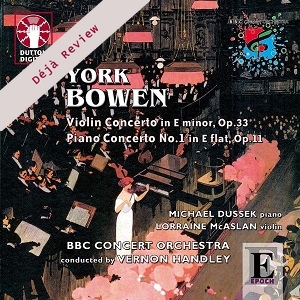
Déjà Review: this review was first published in July 2006 and the recording is still available.
York Bowen (1884-1961)
Violin Concerto in E minor, Op 33 (1913)
Piano Concerto No 1 in E-flat, Op 11 (1903)
Lorraine McAslan (violin)
Michael Dussek (piano)
BBC Concert Orchestra/Vernon Handley
rec. 2005, The Colosseum, Town Hall, Watford, UK
Dutton Epoch CDLX 7169 [64]
The Bowen violin concerto has no pretensions to compactness. Its aspirations are of the most exalted. Its span and its manner and content all announce a vigorous and epic grip.
Completed in 1913 it represents one of Bowen’s creative high water marks. Late-romantic music was to take a pounding after the gritty, murderous reality of the Great War. Rather like his fellow Royal Academy of Music contemporary Joseph Holbrooke, Bowen’s violin concerto was taken up by violinists who were English figures rather than international celebrities. Bowen had to wait seven years until 1920 for a premiere. This was given by Marjorie Hayward at the Proms. There was another performance in Bournemouth three years later but after that the concerto slipped out into the night.
Hearing it now in a performance as ardent as that given here we can wonder at such a profligate waste. The concerto spills over with gloriously succulent tunes. This might easily be by Korngold, but the fleeting parallels with other works are there too: the Elgar, the Tchaikovsky, the Bruch No 1 – even the Coleridge Taylor concerto and especially the Glazunov Violin Concerto. This is, by the way, no tentative performance but a no-holds-barred total immersion. The impression is enhanced by the glorious hollering of the BBC Concert Orchestra horns – notably assertive at the start and end of the first movement. In the slow central movement at 3:11, amid the stream of lyricism pouring liquid gold from the violin, there is a fluttering dreamy pause – a sort of romantic Hollywood dissolve that is extraordinary and quite moving.
The flighty finale dances along with Mendelssohnian singing élan. What you must not expect is that the music will sound particularly English pastoral. It has no linkage at all with that idiom. Rather like Haydn Wood’s Violin Concerto -also awaiting its first commercial recording – the language is thoroughgoingly romantic, owing more to central Europe than to the emerging impressionism of field and byre.
The 26 minute First Piano Concerto was a display vehicle for its teenage composer who premiered it at the RAM on 18 December 1903 with A.C. Mackenzie conducting. Its style is Tchaikovskian, just like Haydn Wood’s Piano Concerto (recorded by Hyperion). This concerto had more of a concert history than the violin concerto simply because it was very much of its time; when the violin concerto appeared, fashion had turned against such lavish extravagance of melody and sentiment. The central scherzo of the Piano Concerto has a Mendelssohnian faery lightness but there are other linkages too including with Saint-Saëns’ Second Piano Concerto and with the equally superb Arensky piano concerto. The concerto ends with a galloping trepak.
Lewis Foreman’s notes provide essential context and do so entertainingly while whetting our appetites for the other concertos – especially the much later Fourth Piano Concerto (a Rachmaninovian work) and the Cello Concerto.
This has to be among the Recordings of the Year.
Now Dutton – do press ahead and give us the other Bowen concertos and please do not forget the Joseph Holbrooke concertos of which the Violin Concerto (known as The Grasshopper), the Cello Concerto The Cambrian and the Third Piano Concerto (also known as the Dance Symphony, Terpsichore and Symphony No 8) are ‘likely lads’.
Bowen’s music is enjoying a renaissance at present with several Dutton and Centaur discs of the chamber music and incredibly no fewer than three versions of the Viola Concerto.
Rob Barnett
Help us financially by purchasing from



















